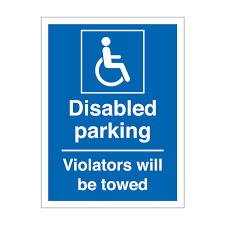Enhancing Accessibility: The Significance of Disabled Parking Spaces

The Importance of Disabled Parking Spaces
Accessible parking spaces for disabled individuals play a crucial role in ensuring equal opportunities and independence for people with disabilities. These designated parking spots are not just a convenience but a necessity for those who face mobility challenges.
Accessibility and Inclusion
Disabled parking spaces are strategically located near building entrances, facilities, and amenities to provide easy access for individuals with disabilities. By having these designated spots close to their destination, disabled individuals can participate more fully in social activities, access essential services, and engage in everyday tasks without unnecessary barriers.
Legal Requirements
In many countries, including the UK, there are legal requirements mandating the provision of designated disabled parking spaces in public areas and facilities. These regulations ensure that businesses, public institutions, and parking facilities are accessible to all members of the community, regardless of their physical abilities.
Improving Safety and Convenience
Having dedicated disabled parking spaces helps improve safety by reducing the distance that individuals with disabilities need to travel from their vehicles to the entrance of a building. It also prevents unauthorised vehicles from occupying these spots, ensuring that they are always available when needed.
Respect and Consideration
Respecting disabled parking spaces is not just a matter of compliance with regulations but a display of empathy and consideration towards individuals with disabilities. By refraining from using these spots unless authorised to do so, we demonstrate our support for inclusivity and accessibility for all members of society.
Conclusion
Disabled parking spaces serve as a tangible symbol of our commitment to creating an inclusive society where everyone has equal opportunities to participate fully in community life. By recognising the importance of these designated spots and advocating for their proper use, we contribute to a more accessible and welcoming environment for individuals with disabilities.
Understanding Disabled Parking: Key Differences, Legal Requirements, Duration Limits, and Regulations
- What is the difference between accessible and disabled parking?
- What is the legal requirement for disabled parking spaces?
- How long can you stay in a disabled parking space?
- Is parking in a disabled bay illegal?
What is the difference between accessible and disabled parking?
The difference between accessible and disabled parking lies in their intended purpose and design. Accessible parking refers to designated parking spaces that are specifically reserved for individuals with disabilities, providing them with close proximity to building entrances and facilities for easier access. On the other hand, disabled parking is a broader term that encompasses all parking spaces designated for individuals with disabilities, including accessible spots as well as other designated areas that may not offer the same level of accessibility features. While accessible parking focuses on providing optimal accessibility, disabled parking serves as a general category encompassing various types of designated spaces tailored to accommodate the needs of individuals with disabilities.
What is the legal requirement for disabled parking spaces?
In the United Kingdom, the legal requirement for disabled parking spaces is outlined in the Equality Act 2010. This legislation mandates that public and private establishments must provide designated parking spaces for disabled individuals to ensure accessibility and inclusivity. The law specifies the number of accessible bays required based on the size of the car park and sets standards for their location, size, and signage. Failure to comply with these regulations can result in penalties and legal consequences, highlighting the importance of upholding the rights of individuals with disabilities to access convenient and safe parking facilities.
How long can you stay in a disabled parking space?
In the UK, the time limit for staying in a disabled parking space can vary depending on the specific regulations of the location. Generally, disabled parking spaces are intended for short-term use by individuals with disabilities who require close access to facilities. It is important to check the signage at each parking area to determine any time restrictions that may apply. Some areas may have designated time limits, while others may allow for extended stays with a valid disabled parking permit displayed. Adhering to these time limits ensures that these essential parking spaces remain available for those who truly need them.
Is parking in a disabled bay illegal?
Parking in a disabled bay without the appropriate permit or authorisation is considered illegal and constitutes a violation of parking regulations. Disabled parking bays are specifically designated for individuals with disabilities who rely on close access to facilities and services. By unlawfully occupying these spaces, individuals not only risk receiving fines or penalties but also prevent those with disabilities from accessing essential amenities conveniently. It is crucial to respect and adhere to the rules governing disabled parking bays to ensure equal access and inclusion for all members of the community.
